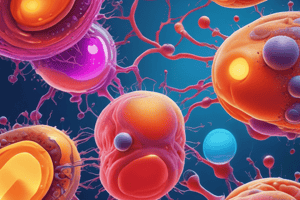Podcast
Questions and Answers
What is the main function of anabolic pathways?
What is the main function of anabolic pathways?
- Detoxify waste products
- Break down complex molecules into simpler ones
- Build up complex molecules from simpler ones (correct)
- Release energy in the process
What is the main purpose of metabolism in living organisms?
What is the main purpose of metabolism in living organisms?
- To store excess energy in the form of fats
- To provide energy for essential bodily functions (correct)
- To create ATP molecules in the cells
- To break down simple molecules into complex ones
Which metabolic pathway breaks down complex molecules into simpler ones?
Which metabolic pathway breaks down complex molecules into simpler ones?
- Photosynthesis
- Citric acid cycle (correct)
- Urea cycle
- None of the above
Which process involves the breaking down of carbohydrates, proteins, and fats into simpler molecules?
Which process involves the breaking down of carbohydrates, proteins, and fats into simpler molecules?
What is the main purpose of the urea cycle?
What is the main purpose of the urea cycle?
What is the primary energy storage molecule produced during catabolism?
What is the primary energy storage molecule produced during catabolism?
Which factor can influence the rate of metabolism?
Which factor can influence the rate of metabolism?
Which metabolic process involves building up complex molecules from simpler ones?
Which metabolic process involves building up complex molecules from simpler ones?
What is one of the main functions of metabolism?
What is one of the main functions of metabolism?
What does the term 'metabolism' mean in Greek?
What does the term 'metabolism' mean in Greek?
What role do the laws of thermodynamics play in understanding metabolism?
What role do the laws of thermodynamics play in understanding metabolism?
Which of the following is NOT a part of metabolism?
Which of the following is NOT a part of metabolism?
Study Notes
Metabolism: Understanding the Process of Energy Production
Introduction
The word "metabolism" comes from the Greek word "metabolē," which means "to change." In the context of biology, metabolism refers to the complex series of chemical reactions that occur within living organisms, including humans, to sustain life and provide the energy needed for essential bodily functions. These reactions involve the breaking down of complex molecules, such as carbohydrates, proteins, and fats, into simpler molecules, as well as the synthesis of new organic material.
Overview of Metabolism
Metabolism is a continuous process that involves thousands of chemical reactions in the body's cells. These reactions are interconnected and form pathways that provide energy to the body. The process of metabolism can be broadly classified into two main categories: catabolism and anabolism.
Catabolism
Catabolism is the process of breaking down complex molecules, such as carbohydrates, proteins, and fats, into simpler molecules. This process releases energy, which is stored in the form of ATP (adenosine triphosphate) in the body's cells. An example of catabolism is cellular respiration, where glucose is broken down to release energy.
Anabolism
Anabolism is the process of building up complex molecules from simpler ones. This process requires energy from ATP and involves the synthesis of new organic material. An example of anabolism is photosynthesis, where plants use the energy of sunlight to convert carbon dioxide into glucose.
Metabolic Pathways
Metabolic pathways are series of connected chemical reactions that feed one another. These pathways take in one or more starting molecules and convert them into products through a series of intermediates. The two main categories of metabolic pathways are catabolic and anabolic.
Catabolic Pathways
Catabolic pathways break down complex molecules into simpler ones, releasing energy in the process. One example is the citric acid cycle, which occurs in the mitochondria of eukaryotic cells and releases energy in the form of ATP.
Anabolic Pathways
Anabolic pathways build up complex molecules from simpler ones, using energy from ATP. One example is the urea cycle, which takes place in the liver and kidneys and is used to detoxify ammonia, a waste product of protein metabolism.
Metabolism and Energy Production
The process of metabolism is essential for energy production in the body. The body needs a minimum number of calories (known as the basal metabolic rate or BMR) to maintain essential functions such as breathing and digestion. The energy from food is used to fuel these processes and is stored in the form of ATP, which is then used by other reactions in the cell as an energy source.
Metabolism is not a static process, and its rate can vary depending on factors such as age, sex, muscle mass, and physical activity. For example, a person with a fast metabolism may burn a lot of calories even while at rest, while someone with a slow metabolism may require fewer calories to sustain their body's functions.
Thermodynamics of Metabolism
The laws of thermodynamics play a crucial role in understanding metabolism. The first law of thermodynamics states that energy can neither be created nor destroyed, while the second law of thermodynamics states that the entropy (disorder) of a closed system always increases over time. These laws help explain the energy flow and transformation in metabolic processes.
Factors Affecting Metabolism
Several factors can influence the rate and efficiency of metabolism. These include genetics, diet, exercise, stress, and environmental factors. Understanding these factors can help in managing metabolic disorders and optimizing overall health.
Conclusion
Metabolism is a complex process that is essential for life. It involves a series of interconnected chemical reactions that provide the body with energy and support its various functions. Understanding metabolism can help us appreciate the intricacy of life and inform strategies for maintaining optimal health.
Studying That Suits You
Use AI to generate personalized quizzes and flashcards to suit your learning preferences.
Description
Test your knowledge on metabolism and the process of energy production in living organisms. Learn about catabolism, anabolism, metabolic pathways, and factors affecting metabolism.




